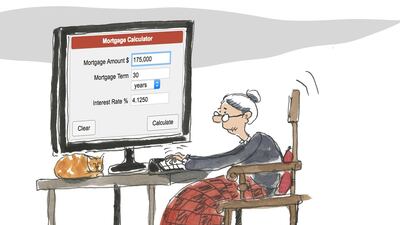I heard an advert for funerals the other day — what struck me wasn’t its simplicity and the upbeat nature with which it parted with facts, but that it addressed you: the end user. Or, as I suggest: the last-time buyer. I found that comforting — being addressed directly, in a matter of fact manner to sort out the final journey.
We will all be last-time buyers at some point. Death is the one certainty in life. In a sense, knowing its finality helps focus things. If there were no end, it would be challenging to plan, pace, put an order to things. Ah, if only we actually lived by that knowledge.
What started me thinking about the term ‘last-time buyer’ was in fact the property market. We hear about first-time buyers, but not older citizens who might be in the market to move.
While considering the idea of whether older people should be eligible for mortgages, regardless of age, I was thrilled to discover that all senior citizens in the US are eligible to buy a home if they qualify because of the Equal Credit Opportunity Act — a federal law which protects borrowers against bias based on age, race, colour, religion, national origin, gender, marital status or even on whether they get public assistance.
In the UK, it turns out that age is a mere guideline. Several building societies there no longer impose an age limit on their mortgage borrowers, meaning the age when the mortgage is taken out, with one society putting the age you can be at the end of the mortgage term, when it needs to be paid off, at 95. Most lenders put this age at 80. To me, it makes sense; we’re living and working longer.
Imagine you have worked close to retirement age, but you still don't have a place to call home outside the UAE — or the cash to buy outright. You want to live closer to family, but don’t have the resources to buy a place where they are. You don’t want the uncertainty of renting — this is likely to be your last home, and you want it to be ‘home’. Settled. Your own style. With your choice of colour and clutter.
The next step would be: how do you fund the purchase? Luckily, the mortgage market is changing to accommodate our lifespans and phases — not everywhere, but at least it’s a start.
Lifetime mortgages are a form of equity release that are increasingly being used by older borrowers who want to buy a property to be closer to family and friends. It is a mortgage that runs for the lifetime of the homeowner with the amount borrowed being calculated using age and the valuation of the property. With a lifetime mortgage, you can choose to take out a loan that does not need to be repaid until you die or go into long-term care.
Because the interest on a lifetime mortgage can be rolled up and added to the original loan — although it doesn’t have to be — there’s a much lower risk of default. So whether you are a model borrower, or even — it could be argued — if you don’t have credit history back home (because you’ve been an expat for so long), you could still qualify.
Plus, lifetime mortgages can come with a no negative equity guarantee. This means a lender promises that you will never have to pay back more than the value of your home if it’s sold. And, yes, if you want to sell, you can. The guarantee also applies to your beneficiaries if you die leaving a lifetime mortgage behind.
A lifetime lease is another type of plan aimed at people who cannot afford to, or don't want to, pay the full price for a property. A lifetime lease company is paid a discounted price for your right to live in the property for your lifetime or lifetimes if there are two of you. The actual owner is the lifetime lease company which gets the property on your death. There is the option to ensure that up to 50 per cent of the property’s future value can be passed on as an inheritance.
And this leads us to what I believe is the biggest issue to consider: knowing that your home will not benefit your kith and kin. Personally, I think you need to do what’s best for you — while taking into account obligations towards a dependent. As a last-time buyer, it might mean putting yourself first.
Nima Abu Wardeh is a broadcast journalist, columnist and blogger. Share her journey on finding-nima.com

